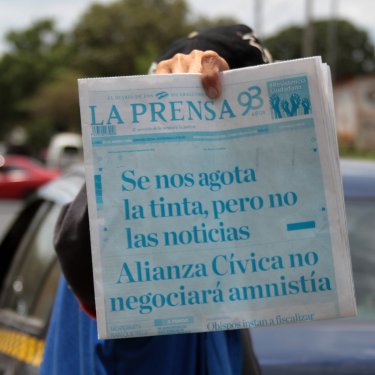Release of newsprint offers “provisional respite” to Nicaragua’s last newspapers

Reporters Without Borders (RSF) welcomes the release of the newsprint and ink for Nicaragua’s last two independent daily newspapers that had been arbitrarily blocked in customs for the past 18 months. But this provisional respite must not deflect attention from the censorship to which the state has subjected the media since 2018, RSF said.
Thanks to mediation by the Vatican representative in Nicaragua*, Papal Nuncio Stanislaw Waldemar Sommertag, the General Directorate of Customs finally agreed on 7 February to allow La Prensa and its sister newspaper Hoy to receive the raw material, including 90 tons of newsprint, that it had been holding for the past 18 months.
The publishing house that owns both newspapers, Grupo Editorial La Prensa, immediately sent employees to examine the condition of the supplies. They found that some of the newsprint was infested with mites, and that it would therefore have to be quarantined and was probably unusable. The newspapers were nonetheless able to take possession of all the supplies yesterday.
Without any explanation, President Daniel Ortega’s government had denied Nicaragua’s privately-owned newspapers access to their imported newsprint, ink and rubber since September 2018, depriving them of the raw materials they need to produce print editions and throttling them economically. This resulted in the disappearance of most of the print media including El Nuevo Diario, which closed in September 2019, ending 40 years of publishing in Nicaragua.
The two surviving newspapers, La Prensa (founded 1926) and Hoy, had to drastically reduce their size and print run in order to eke out their dwindling raw material stocks for as long possible. La Prensa has reduced its size from 36 to 8 pages, and both La Prensa and Hoy are now distributed in only four of the country’s 17 districts. In a 27 January editorial headlined “The dictatorship strangles La Prensa,” La Prensa’s editorial board said the newspaper’s days were now numbered as a result of this form of censorship.
“The unblocking of the raw material essential for producing La Prensa group’s newspapers is an encouraging sign but it offers the country’s last two newspapers only a provisional respite,” said Emmanuel Colombié, the head of RSF’s Latin America bureau.
“We ask President Ortega’s government to put a stop to all forms of administrative censorship, which have such disastrous consequences for Nicaraguan society in its entirety, and to comply strictly with Nicaragua’s international obligations, which implies guaranteeing and protecting press freedom.”
Nicaragua has seen repeated attacks on its independent media since its political crisis worsened in April 2018. The police have seized equipment, carried out searches without a warrant and even surrounded media premises, including Confidencial, 100% Noticias, Niú and Esta Semana, which have been blocked since December 2018. Journalists are often the victims of smear campaigns, arbitrary arrest and even death threats, to the point that some have fled the country.
Nicaragua’s newspapers have tried to reorganize online but, in a country where barely 20% of the population has online access – the lowest rate in Central America – the Internet alone has not ensured their survival.
In a report entitled “Newspapers that never arrive,” published in September 2019, RSF shed light on the methods used by governments, powerful oligarchs and private corporations – including restricting access to newsprint – to obstruct the publication and distribution of print media.
In Nicaragua’s case, the policy of depriving outspoken media outlets of the raw material they need was inspired by the Venezuelan government’s example.
Nicaragua is ranked 114th out of 180 countries in RSF’s 2019 World Press Freedom Index.
*The Catholic Church has tried to mediate between the government, civil society and opposition in Nicaragua ever since the political crisis worsened in 2018.


